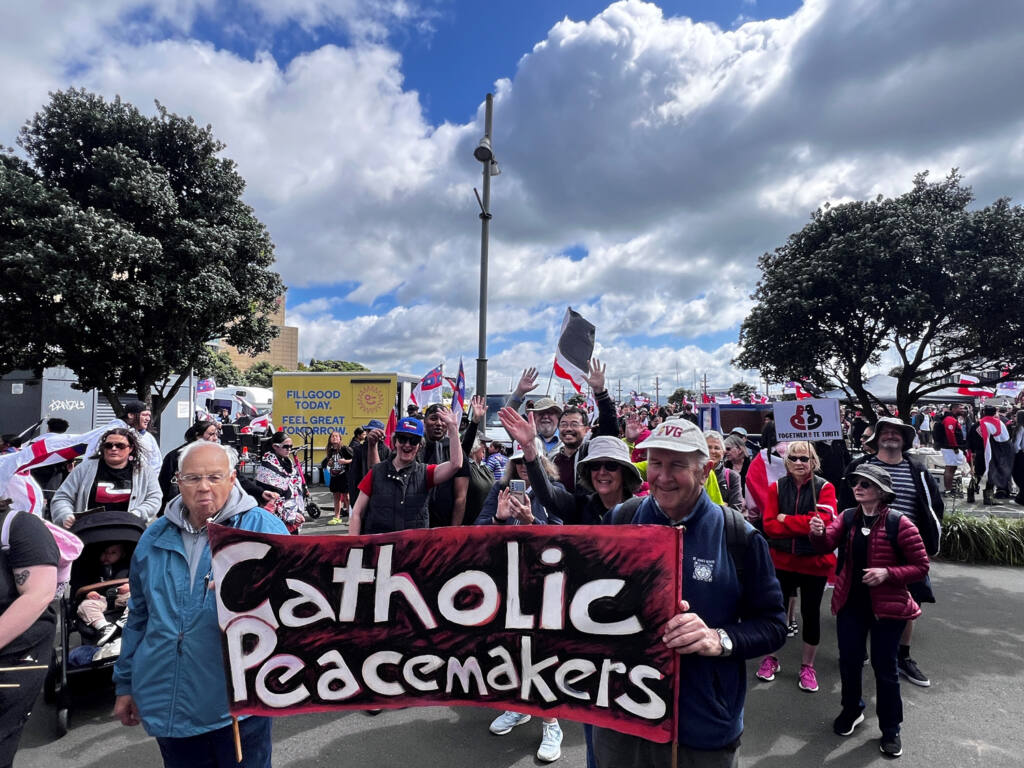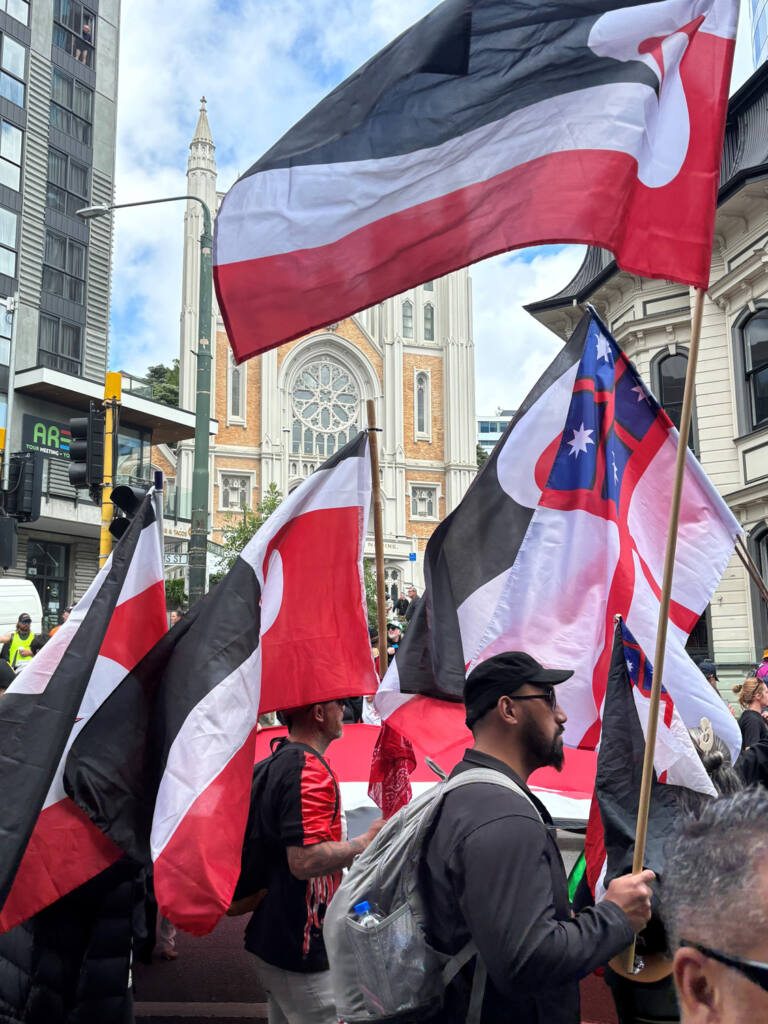WelCom December 2024/January 2025
Michael Fitzsimons
The Hīkoi mō Te Tiriti, a nationwide protest against the Treaty Principles Bill, culminated in Wellington on 19 November where more than 40,000 participants walked from Waitangi Park through the heart of the city to Parliament grounds.
As the leaders of the Hīkoi arrived at Parliament, the march stretched back through the CBD to Taranaki Street. It is thought to be New Zealand’s largest-ever protest.
Many members of the Christian and Catholic communities were involved in the Hīkoi, including Catholic Peacemakers and Challenge 2000. On the morning of the Wellington march, about 130 people gathered at St Mary of the Angels to pray before the national shrine to Mary, Mother of God | Whaea o te Atua.
‘The group then joined the thousands who moved slowly through the city towards Parliament, making a powerful statement of support for Te Tiriti as a basis for a peaceful, just and inclusive way forward for the country,’ said Vicar-General of the Wellington Archdiocese Mons Gerard Burns who was one of the group.
‘People from many backgrounds and nations joined Māōri in this well-organised and coordinated action. The atmosphere was positive, welcoming and full of chants, songs, haka, creative signs and sharing of stories. Interesting conversations took place along the route,’ said Msgr Gerard.
‘One grandmother confided to me that in her history her Māori mother was not welcomed into her father’s family and so had always felt she had to ‘hide’ her Māori genealogy and defer to her husband’s side. This meant the children did not grow up knowing their own connections well, nor their language. She rejoiced this was now more possible but it was still a challenge to re-discover those connections. She was walking for her grandchildren.’
Msgr Gerard said he saw Te Tiriti in terms of a covenant, similar to the covenants of the Scripture.
‘It’s a covenant for everyone. It’s for Māori. It’s for others – like my family – who moved here a few generations ago,’ he says. ‘But it hasn’t always been honoured.
‘I have been involved in various social justice issues for a long time and one of the longest is the question of Māori rights, given the marginalisation of iwi Māori during the European settlement and colonisation of Aotearoa New Zealand since 1840. All in contravention of the promises made by the British Crown in the Treaty of Waitangi.’
Msgr Gerard said that in the last 40 years, the Treaty had been given new life by Māori advocacy, solid academic and historical work, and a broadening of knowledge about this country’s history.
‘This has filtered into everyday life, the law, practice of institutions, art, theatre, education, religious ceremonies. Generally this has been positive for our country.
‘A variety of legislative projects are looking to roll back some of these developments and for what reason? I think to promote the possibilities of wealth for a few, under the guise of promoting debate, ensuring democracy, etc.’
Msgr Gerard Burns is the Administrator of Te Pariha of Te Ngakau Tapu in Porirua, which was among many parish communities hosting whānau from across the country attending the Hīkoi.
Open Letter
Catholic leaders, including Archbishop Paul Martin sm, Bishops Michael Dooley and Steve Lowe were among 400 church leaders who signed an open letter to MPs in September, calling on them to vote down the Treaty Principles Bill at its first reading.
The Christian leaders expressed their concerns that should the bill advance past its first reading, it would drive more divisiveness within Aotearoa.
The letter states: ‘As Christian leaders from across Aotearoa New Zealand we express our commitment to Te Tiriti o Waitangi. We affirm that Te Tiriti o Waitangi protects the Tino Rangatiratanga of hapū and iwi. That rangatiratanga over land and taonga is to be upheld.
‘We therefore express our opposition to the proposed Treaty Principles Bill.
‘The proposed bill is inconsistent with Te Tiriti o Waitangi in that it does not recognise the collective rights of iwi Māori or guarantee their relationship with the Crown. It would undermine what Te Tiriti guarantees, and what decades of law, jurisprudence and policy have sought to recognise.
‘We call on all Members of Parliament to do everything in their power to not take this bill to select committee and to work towards the ongoing restoration of the Tiriti relationship,’ the letter said.
The purpose of David Seymour’s bill is to seek to define in law the principles of the Te Tiriti o Waitangi and require, where relevant, those principles to be used when interpreting legislation. The effect of the bill would be to limit Government action in respect to its Treaty partner. The bill would curtail the ongoing implementation of Government policies which redress injustices, address inequities and honour the Treaty principles of partnership, reciprocity, and the Article 2 promise of rangatiratanga.
The closing date for submissions on the Treaty Principles Bill is 7 January 2025. Submissions can only be made via the portal on the Parliament website or via post. Common Grace Aotearoa, a Christian action group, has more information on making a submission: www.treatyandbelonging.nz/speakup

